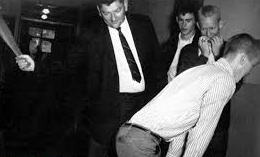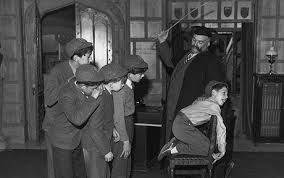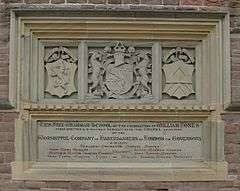- Dark speak easy part one - 18th February 2026
- X marks the spot again - 17th February 2026
- Wordy again part three - 16th February 2026

On The Eye our Editor Phil Parry has described how he was helped to break into the South Wales Echo office car, recalled his early career, the importance of experience in the job, making clear that ‘calls’ to emergency services and court cases are central to any media operation, as well as the vital role of the accurate quotation.
He has also explained how poorly paid most journalism is, the importance of expenses, and about some of those he has interviewed for the now-defunct BBC Wales TV Current Affairs series, Week In Week Out, which won an award even after it was axed.
Here he explores the devastating effect of his education in Monmouth School.

I pay only a muted tribute to one of my old science teachers in the boys’ school I attended who has just died, because his death has thrown into stark relief the physical abuse suffered by children.
AW ‘Bill’ Griffiths was in charge of Chemistry at Monmouth School from 1962 to 1993, and has died of old age.
The funeral notice from the Old Monmothian Club says he: “passed away peacefully in his sleep on Sunday 4th November 2018”.
But ‘peace’ was never a word we associated with ‘Bill Griff’.
He was a teacher who physically assaulted children. I clearly remember being hit in the head by him because, along with the rest of the class, I was ‘marching’ into the Chemistry lesson and making a noise on the wooden floor.
‘Bill Griff’s’ attack sent me spinning into the hallway where I had to spend the rest of the lesson. I saw stars.

He was also housemaster of the small boys boarding house called St James’, where the children went before they were assigned to their allotted senior houses. He hit boys there too.
I remember a young friend of mine confided in me that ‘Bill Griff’ had told him that although he caned other boys he would not touch him because he liked him. These were children of 11 or 12.
Another master used to keep an old ‘dap’ or plimsole in his bag to hit the boys if they misbehaved. Before the beating took place he would often ask the class to vote on whether the dap should be used and, of course, boys being boys, they invariably voted for the assault to take place. This teacher was a genuine fascist and wore a black arm band to school the day that Franco died.


A class vote before the beating happened to me once (I was always getting beaten for day dreaming or talking in class) and everyone voted for me to be dapped except, to his eternal credit, my best friend at the time.
A biology teacher used to beat boys on their behinds using a large pair of wooden protractors with the word ‘IDIOT’ scrawled on the instrument backwards in chalk. After the beating took place the victim would have ‘IDIOT’ in chalk the right way round on his backside.
On another occasion when I was misbehaving in the dinner queue, a master came up behind me, hurled me down a flight of stone stairs and held me up against a wall. I was only 12.

But these assaults had a terrible effect on us as children, which lasted until we were adults.
My best mate in school (the one who voted for me not to be beaten, and who is still a friend of mine today) only told me earlier this year of how he was caned by the Headmaster for riding his bike in the wrong part of school. He is in his 50s.
He found the experience painful, and so deeply humiliating he did not tell me at the time. Only now has he told me, even though I have seen him countless times since we both left Monmouth.

Before I arrived at the school even superior Prefects (called ‘Monitors’) were allowed to beat younger children. The satirical film ‘If’ was actually spot on. That appalling phrase “it never did me any harm” could not be further from the truth.
Monmouth School is a second division independent or ‘public’ school and certainly not in the same league as Eton or Westminster. The motto is “Serve And Obey”.

As pupils we came to know that motto well, because if we stepped out of line we were regularly beaten.
Apart from the abuse, it was a very traditional school with an ever-present air of menace.
Prefects were allowed to dispense summary justice in the form of ‘drills’ which were basically orders to do lines after school, and if your work was not up to scratch you were given a ‘detention’ to write a short essay on Saturdays before watching the first 15 play rugby, which was obligatory.

As a special privilege, prefects (which I was never appointed as I was a bit of a rebel) were allowed to push in the dinner queue and walk on a central bit of grass.

I breathed a huge sigh of relief when I left after seven years to go to university.
Thankfully, now, the boys are extremely well-taught at Monmouth School and physical punishment is not allowed. But when I went there it was effectively a Grammar School with pretensions, and I was admitted on a ‘Direct Grant’.
I always remember we were not allowed to call it a ‘Grammar School’ because that was rather looked down on (although it never did Manchester Grammar School any harm!) but everything has changed today.

In state-run schools, and in independent schools where some of the funding came from state coffers, beatings were outlawed in 1986, following a 1982 ruling by the European Court of Human Rights that such punishment could not be administered without parental consent, and that a child’s “right to education” could not be infringed. In other independent schools, it was banned in 1998 (in England and Wales), 2000 (in Scotland) and 2003 (in Northern Ireland).

At the time a total ban was being prepared to come into force in Wales the NSPCC Cymru/Wales said: “We welcome the steps being taken by the Welsh Government towards removing the defence of ‘reasonable punishment’. Every child deserves equal protection under the law and should be protected from such draconian forms of discipline. It is wrong that a defence which does not exist in a case of common assault against an adult can be used to justify striking a child.”

Most countries around the world have made it unlawful to assault children.
In Argentina, for example, it was banned in 1813, but was re-legalised in 1817 and punishments by caning lasted for decades. Yet all corporal punishment finally became prohibited through a law in 2014 which came into force in January 2016.
A friend of mine who lives opposite, attended Monmouth School in the 1960s when the physical abuse by teachers on children was even worse.
He hates the school even more than I do, and we meet up regularly to talk about the beatings, which we call our ‘therapy sessions’.

At one of them he told me: “We can’t tell our wives because they simply wouldn’t understand. I can only talk to you about this”.
These ‘therapy sessions’ are likely to continue for many years to come…
Tomorrow – University of life part two and more alarming revelations made exclusively by The Eye of controversial events inside a crisis-hit Welsh university, where staff are hugely frustrated that the mainstream media in Wales consistently ignore what is happening.
Check your knowledge of today’s events as revealed over the last few months on The Eye, with our brilliant interactive quiz: [viralQuiz id=1]










I attended Monmouth School 1960 to 1966. I was a friend of Bob Parry.
While I do not agree with physical punishment, I must say that I do not consider it did me any harm and as a thoroughly difficult student I was caned regularly by Monmouth House housemaster, the Headmaster and a maths teacher. I knew about these punishments and it was in my gift to avoid most of them by behaving properly – or at least in line with school rules. I probably wrote more ‘lines’ – given by prefects- than was the norm. When I didn’t do them I would probably be caned. I thought that better than writing endless lines.
I bore no grudge and still don’t. There is too much laxity in schools today – not that corporal punishment should be allowed – and that has had severe behavioural consequences.
I had no consequential traumas, attending Sheffield University, qualifying as a Solicitor and later becoming CEO of a Unitary Authority. I was later awarded the MBE. I have two children, 2 grandchildren and never had any hangups related to school. Nor have I ever been worried about talking about it. Everyone is different. It is a mistake to draw absolute conclusions based on individual stories. It may make good press but it is not balanced journalism without balance. I repeat that I am glad that corporal punishment has been phased out but don’t blame Monmouth School for 80 year old practices.